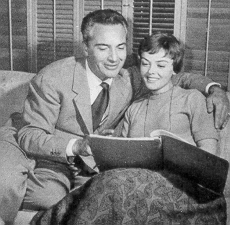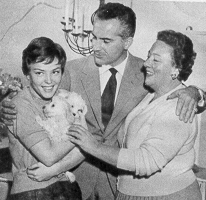

(Photos: Rossano Brazzi, Lidia Brazzi and Christine Carere, at Rossano & Lidia's home)
Cast
Rossano Brazzi
Christine Carere
Bradford Dillman
Joan Fontaine
Steven Geray
Kathryn Givney
Katherine Locke
Johnny Mathis
Director
Jean Negulesco
Writers
Frances Goodrich
Albert Hackett
Director of Photography
Milton R. Krasner
Music
Sammy Fain
Alfred Newman
Production Design
John DeCuir
Lyle R. Wheeler
Costumes
Charles LeMaire
Mary Wills
Production
20th Century Fox
Synopsis/Review
While researching the particulars of A Certain Smile we ran across THIS little gem of a synopsis:
"Francoise Sagan's novella becomes overblown soap opera in romantic trivia between Parisian students Carere and Dillman, interrupted when she is beguiled by rouè Brazzi; chic Fontaine is wasted."Leonard Maltin's Film & Theater Guide, (1996)
... which proves one very important point: Leonard Maltin is a muddle-headed dimwit, who probably merely rewrote the Films in Review synopsis (1973), which was equally lopsided: why is it that a film depicting a man's emotions and experiences is always a "powerful drama" while one depicting a woman's is a "soap opera" or a "melodrama" full of "romantic trivia"??...
He is, quite simply, wrong.
A Certain Smile (1958) is a sophisticated, sharply painted psychological portrait of two people desperately trying to fill their own empty spaces with each other, and nearly destroying the lives around them in the process. It is emotional, but it is also beautifully told, wonderfully acted and, at times, very funny.
Dominique (Christine Carere), an attractive young college student at the Sorbonne in Paris, is caught between two emotionally crippled parents still mourning the loss of their only son in an accident, and a fiance, Bertrand, who speaks and acts for her with little regard for her own wishes. She is introduced to Bertrand's aunt and uncle (Joan Fontaine and Rossano Brazzi) and is drawn to both of them, for different reasons. Luc, Bertrand's extremely handsome uncle, initially appears to be the smooth, self-assured seducer of young women (the rouè Maltin describes ... our guess is that he only stayed awake through the first ten minutes before rendering his opinion), while his wife, Francoise, warmly and wonderfully played by Joan Fontaine -- who is most assuredly NOT wasted in this - seems cheerfully unaware of his infidelities.
That Dominique seeks in him the love and undivided attention she is not receiving at home, and that he sees in her another sexual conquest is initially obvious, yet their relationship develops in an unexpected direction. He suggests they meet for a week on the Riviera. Unaware of the growing attraction between her husband and her nephew's fiance, Francoise immediately befriends Dominique, taking to her like a mother to a daughter. In fact, she becomes a surrogate mother in many ways, dressing her, giving her aspirin for a headache, presenting her with a gift of a red (the color of passion, infidelity) coat to wear, offering to console her during a separation from Bertrand caused by Dominique's awareness that she is falling in love with Luc. That Dominique willingly and eagerly reciprocates this surrogate mother-daughter exchange with the fervor she does makes her attraction for Luc all the more unbearable. Francoise is giving her the love her own mother cannot provide anymore, and she finally feels fulfilled and loved. She finds that being the focus of anyone's world is intoxicating -- she sees herself as "the center of an absorbing drama". Attempting to repress her feelings for Luc, Dominique once again looks to Bertrand for "protection", until he visits her at her parents' home. Her mother ruins the visit by confusing Bertrand with her own dead son and fleeing from the room. Dominique is furious that her longing for love and life is again crushed by her mother's obsession with the dead. She begs Bertrand to elope, but he rebukes her sharply for her selfishness and impatience, and pushes her back into the confines of her emotionally dead family by withdrawing so as to spare her mother's feelings. In so doing, he unwittingly pushes her towards the surrogate mother-father figures she so desperately needs - she agrees to Luc's request to meet him on the Riviera.
Luc, who has obviously been down this particular road before, has planned a week filled with all of the trappings of a traditional illicit love affair, but Dominique will have none of it. "That sounds revolting!" she declares, when he describes the plans he has made. She announces forcefully she doesn't want to be like every other girl he has brought to the Riviera, she wants everything to be completely different - a startled and bemused Luc realizes he doesn't quite have the control over this girl that he thought he did. We next see him, awkward, dejected, bored and stiff in a jacket and tie perched at the end of a dock with a fishing pole, completely out of his element ... probably wondering where and when everything had suddenly turned on its head. Dominique, in jeans, bare feet and a straw hat, has decided to take him fishing. She asks him if he's ever gone fishing before.
"No, never. Oh, I swear it. Not with anyone.", Luc assures her, quite truthfully. Moments later, he is startled out of his boredom by a jerk on the fishing line -- and hauls up his "catch". "Oh look," he observes miserably, "I drowned another worm ...!"
That director Jean Negulesco (who was responsible for pulling Rossano back from near obscurity by casting him in Three Coins) found and nurtured such a comedic streak in him is quite evident in these scenes - he is delightfully funny as the self-assured, sophisticated and experienced older man completely undone by a young girl's energy, tastes and interests. Over the course of their week together, she brings out a very childlike side in him: they play with toys, explore the back streets of the Riviera, he plays sleight-of-hand games on the beach with two children - and these scenes are absolutely marvelous. Dominique is convinced that she has found the real Luc and has made him fall in love with her. And, in truth, perhaps she has, which frightens him. So much so, in fact, that once back in Paris, he hastily tries to resume his familiar lifestyle, and his abandonment of her destroys her. Finding him in a cafe with another young woman, Dominique runs away and, not watching where she is going, is struck by a car. Luc, (who does love her, in his way), carries the feverish and unconscious Dominique back to the only person he knows who "can fix anything, from a broken cup to a broken home." - Francoise, who, meeting him at the door with the unconscious girl in his arms, now realizes the real nature of the relationship between the girl she loves and her husband she loves. The wordless emotional exchange of complete and naked understanding between the guilt-ridden and terrified Luc and the devastated Francoise is one of the more powerful moments in the film. As Luc sets Dominique on the bed and withdraws from the room silently, pulling a mirrored door closed behind him, the reflection of the unconscious and silent girl/mistress in one half of the mirror, being stared at by the equally silent and shattered women/wife/ mother on the other, is a powerful image.
Francoise sets aside her shattered heart to once again care for Dominique, we learn that it was, in fact, the loss of a child, presumably a daughter, that not only kept Luc and Francoise together but lay behind Francoise's heartfelt love for Dominique. She tells Dominique that she had always known of Luc's dalliances (and hated them), and had never confronted him, but, "Would that it were that simple: that I should scold you like a little girl and everything would be alright." she whispers, "But that it was YOU ... you, who I couldn't have loved more had you been my very own ...." -- she cannot finish, and Dominique realizes that the love between Francoise (her surrogate mother) and herself, is forever lost. Still, it has given Francoise the strength to confront her husband at last. When Dominique is pushed back once again into her emotional dead family (her father picks her up), Francoise packs to leave as well.
Tears of anguish filling his eyes, Luc admits that this was the first time he'd ever had to face this possibility: that he'd lain awake in the dark, contemplating life without her. "I had to face what I am", he confesses, "Weak, vain. I imagined myself ten or twenty years from now, an aging Casanova, still chasing after what I can never have ... and I hate what I see." He pleads with her not to leave him, tearfully clinging to her for sanctuary and comfort. The powerful emotions struggling with each other on her once placid face tell the story of her own torn emotions.
Back at the Sorbonne, the ravages of her lost loves on her own face, Dominique once again reaches out to Bertrand, who comes to her side without saying a word. Their silence is significant - they will come together again, but they are back where they started: he will never be able to fill all her emptiness, and she will never be content. The final shot is the courtyard of the crowded Sorbonne, bracketed by sturdy, unchanging Gothic architecture - a crowded, energy-filled box, or a tomb perhaps, but a restricted space nonetheless, barred on all four sides.
Additional NotesTo our surprise, this film appears to be the first (or one OF the very first) film appearances by a very young Johnny Mathis,who sings the title song, "A Certain Smile" in its entirety, in a nightclub to which Luc, Francoise and some of their friends have taken Dominique. The song "A Certain Smile" is available on "More of Johnny Mathis' Greatest Hits", Columbia Records' CL1344.
Viewer's Comments
Home Page
Last Minute News
Biography
Filmography
Video Library
Theater Roles
Film & Theater Awards
Article Library
Source Listing
Selected Newsletter Articles
Associated Recordings
Related Reading Material
"The Never Ending Serial"
Rossano on TV this month
Created by the Rossano Brazzi International Network
BENDITA-LUCIA, INC. Web Page Design and Construction
and
D&S Associates
Web Site Hosting, Design and Consulting
Webmasters of Neponset.Com
http://www.neponset.com
Voicemail: (781)329-1344
Fax: (781) 329-4751
Awards: Top 5% of the Web, Top 500 Film & Video Sites
Member of the Internet Developers Association, the HTML Writers' Guild,
and the Neponset Valley Chamber of Commerce